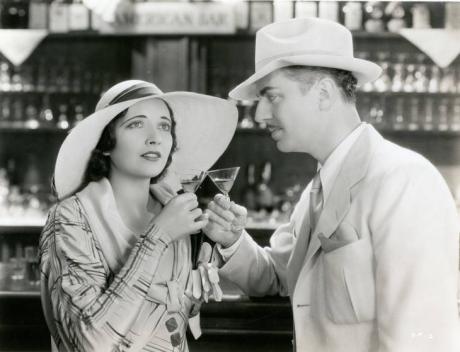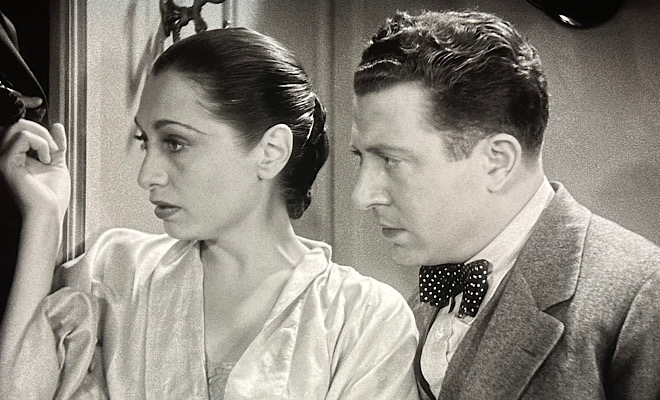
Warner Bros., 1932. Director: Tay Garnett. Screenplay: Wilson Mizner and Joseph Jackson, based on a story by Robert Lord. Camera: Robert Kurrle. Film editor: Ralph Dawson. Cast: William Powell, Kay Francis, Aline MacMahon, Frank McHugh, Warren Hymer, Frederick Burton, Douglas Gerrard, Herbert Mundin.
I often like to start the new year with a Warner Bros. pre-Code picture, and this year we’ve got a beauty. One Way Passage is not exactly an unknown film—in fact, it has its share of devotees—but on the other hand it’s not one of the better-known classics, and its status seems to ebb and flow intermittently, long periods of neglect followed by a fresh rediscovery. Currently it seems due for rediscovery, partly because of the beautiful Blu-Ray edition recently issued by Warner Archive, transferred from a new high-resolution scan. The viewer who has long admired this film, even in mediocre 16mm dupes, will be still more gratified by this new edition that faithfully reproduces the full visual quality of the original.
One of the things I like most about pre-Code films is their uncompromising look at the realities of American life during the early years of the Depression. Warners had a special knack for this gritty, street-level viewpoint in their films. By 1932 they had long since proven themselves the masters of crime movies, having produced at least two of the all-time classics of the gangster film: Little Caesar and Public Enemy. But One Way Passage is proof, as early as 1932, that they could expand beyond that foundation; it embodies the tough, bittersweet romanticism that we associate with later films like Dark Victory or Casablanca.
Its premise is irresistible. William Powell and Kay Francis meet by chance in Hong Kong, are instantly smitten with each other, and then unexpectedly meet again on an ocean liner bound for San Francisco. The stage is set for a romance—but each of the lovers is carrying a dark secret, unbeknownst to the other. Kay Francis is suffering from an unspecified disease that could end her life at any moment; her doctor, traveling with her, is uncertain that she can survive even this voyage. Powell, for his part, is a convicted murderer, long on the run from the law, but now apprehended and being taken back to San Quentin to face execution. Each is suddenly and acutely conscious of the preciousness of life, and this unspoken yearning hangs over their romance, investing it with an aching pathos.
As compelling as this premise is—and it did earn Robert Lord an Academy Award for best original story—in the wrong hands it could easily have become an insufferably maudlin film. Happily, it emerges instead as a cinematic gem, produced with subtlety and restraint. From the opening tracking shot through a crowded Hong Kong bar, we know we’re in the hands of an expert filmmaker, or rather an expert filmmaking team. The talented and colorful Wilson Mizner, on whom I’ve commented before in this space, contributes his witty touch to the script. Tay Garnett, himself an accomplished writer, had recently stepped into the role of director, and guides this story with a sure hand and an innate filmic sense. Robert Kurrle’s camera is constantly in motion, now gliding along the ship’s corridors, now subtly isolating a telling detail in closeup.
And, of course, there’s the cast. William Powell and Kay Francis, fresh from their teaming in the frothy Jewel Robbery, shift gears for this far more subdued and touching story and demonstrate that their screen chemistry is just as strong as ever. And Powell is not the only lawbreaker on board this ship; the supporting cast includes Warners stalwart Frank McHugh as a pickpocket who is rarely sober but infallibly light-fingered, and the underappreciated but enormously talented Aline MacMahon as a con artist par excellence. And that’s only the beginning. Regular readers of this column will know that I like to single out the beloved, but often unbilled, Hollywood character players for special notice. One Way Passage offers a virtual gallery of these unsung players: Warren Hymer as the ham-fisted detective who takes Powell into custody, Roscoe Karns as the ship’s bartender, Herbert Mundin as an indiscreet steward, tough guys Dewey Robinson and Stanley Fields as Powell’s would-be accomplices in Honolulu, and more. With so much going for it, and especially in its handsome new Blu-Ray configuration, One Way Passage is a lovely craft in which to set sail upon the new year.
for this far more subdued and touching story and demonstrate that their screen chemistry is just as strong as ever. And Powell is not the only lawbreaker on board this ship; the supporting cast includes Warners stalwart Frank McHugh as a pickpocket who is rarely sober but infallibly light-fingered, and the underappreciated but enormously talented Aline MacMahon as a con artist par excellence. And that’s only the beginning. Regular readers of this column will know that I like to single out the beloved, but often unbilled, Hollywood character players for special notice. One Way Passage offers a virtual gallery of these unsung players: Warren Hymer as the ham-fisted detective who takes Powell into custody, Roscoe Karns as the ship’s bartender, Herbert Mundin as an indiscreet steward, tough guys Dewey Robinson and Stanley Fields as Powell’s would-be accomplices in Honolulu, and more. With so much going for it, and especially in its handsome new Blu-Ray configuration, One Way Passage is a lovely craft in which to set sail upon the new year.

